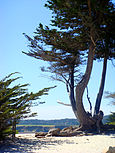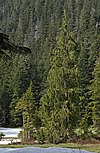Leyland cypress
The Leyland cypress (× Cuprocyparis leylandii ) is a hybrid between the Monterey cypress ( Cupressus macrocarpa ) and the Nootka false cypress ( Xanthocyparis nootkatensis ) in the cypress family (Cupressaceae). It is particularly popular in Great Britain as a hedge and windbreak.
description
The Leyland cypress is a large, evergreen tree . It grows very quickly with annual increases of one meter. The crown of many forms is broadly columnar with slightly overhanging branch tips. The branches are somewhat flattened and densely covered with scale-shaped needles.
use
The Leyland cypress is mostly used as a hedge plant, although it does not tolerate a cut in old wood. It grows in different soils, some of which are poor in nutrients. It can also be used near the coast.
Some varieties were selected, for example with yellowish colored leaves ('Castlewellan Gold', 'Gold Rider', 'Robinson's Gold') or with cream-colored variegation ('Silver Dust'). The somewhat gray-colored variety 'Haggerston Gray', which originated in Leighton Hall , Wales in 1888, is often planted .
ingredients
The Leyland cypress can cause an allergic skin reaction on contact.
Systematics
One of the parents of the Leyland cypress, the Nootka false cypress, is variously classified into the genera Chamaecyparis , Xanthocyparis or Cupressus . Accordingly, the Leyland cypress is named differently, × Cupressocyparis leylandii , × Cuprocyparis leylandii or Cupressus × leylandii .
Two other crosses between the Nootka false cypress and other cypress species are also known:
- Cupressus arizonica var. Glabra × Xanthocyparis nootkatensis (x Cuprocyparis notabilis )
- Cupressus lusitanica × Xanthocyparis nootkatensis (× Cuprocyparis ovensii )
Web links
Individual evidence
- ↑ a b c d John Kelly, John Hillier (Ed.): Trees & Bushes . Thalacker, Braunschweig 1997, ISBN 3-87815-086-5 , pp. 256-257.



